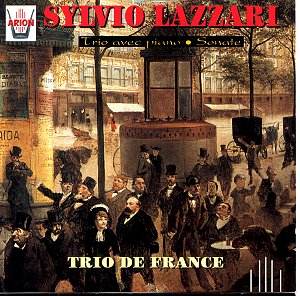The passion and commitment of these performances is remarkable, and had me looking to see if they were recorded live. But they are indeed studio recordings, making all the more striking the way they take you to the heart of this superb but unfamiliar composer. Lazzari was an Italian who visited Paris at the age of 25 after qualifying as a lawyer (yet another one!), and basically never left. Listening to his music, it comes as no surprise that he was a young admirer and associate of César Franck's, and there are undeniable traces of the older composer's influence. Wagner, Brahms and Schumann loom large in the music too, but more notable is its confident individuality.
The Trio is a large-scale work, which moves from a thoughtful, even brooding, introduction to a positive, massively energetic finale. In between lie an expressive and harmonically gorgeous slow movement and a disarmingly innocent Allegretto. The only places where the inspiration seems to falter momentarily are the over-repetitive sequences of the slow movement and the slightly predicable fugal episode in the finale; but even these passing moments fail to undermine the powerful cumulative effect of the piece.
The Trio is Lazzari's first major work, presented to the public when he was thirty years old. The Violin Sonata is somewhat later, dating from 1893. It doesn't have the forward propulsion of the Trio, being a more reflective, lyrical piece, yet it is full of the same intense expressiveness and harmonic daring. Texture is inevitably less varied, and the piano writing occasionally relies too much on rippling arpeggios and the like. But, again, this is a work obviously conceived as a whole, and as such is highly convincing. The booklet tells us that the great violinist Ysaÿe, to whom it is dedicated, championed the piece throughout his subsequent career, and that is a high recommendation indeed.
The performances here, by members of the Trio de France are, as I say, wonderfully convincing, conveying both the music's passion and a belief in its intrinsic quality. I hope string players (and pianists) will take up these works and give them the airings they so richly deserve.
Gwyn Parry-Jones

![]() Trio de France
Trio de France ![]() ARION 68360 [75.24]
ARION 68360 [75.24]
